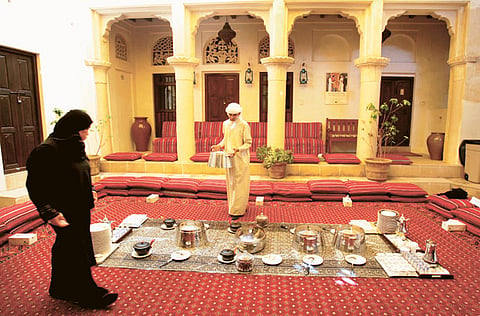Fostering better cultural understanding
Centre helps foreigners be aware of acceptable behaviour and sensitivities

Dubai: The concept of imposing stringent ‘dos and don'ts' for regulated behaviour in the UAE has been given "too much emphasis" according to the Shaikh Mohammad Centre for Cultural Understanding (SMCCU).
"At the end of the day, the dos and don'ts qualify for each and everyone. For me (as an individual Emirati) you can do some of the don'ts," Naseef Kayed, General Manager of the Centre, told Gulf News, "but with somebody else, you might not be able to. For example, I shake hands with people, but others might not."
"So how you learn to deal with it is not as a mass culture as much as it is the individuality of the person you deal with," he said.
The concept of ‘dos and don'ts' of living in the UAE is becoming a stereotype, he continued, adding that people should place more emphasis on getting to know what's acceptable for each individual, learn about your surroundings and the people you're dealing with on a personal level.
One incident of disrespect can lead to the perspective that all people engaging in the same action, for example, expatriates wearing local dress, are intending to disrespect.
"With that, we create not cultural understanding but ‘they' and ‘us,' ‘we' and ‘them.' This centre is not about that, " he said.
Earlier this year, the British Embassy in Dubai released an information booklet, stipulating the ‘dos and don'ts' for British residents and visitors to the UAE. The Consul General Guy Warrington warned the audience that Britons are more likely to be arrested in the UAE than anywhere else in the world, except Thailand.
The key, general rule for the code of conduct in the UAE is modesty. "It's religious, it's cultural for the Arabian Peninsula," Kayed said. For example, he continued, it's similar to smoking and non-smoking. There are specific rules for smoking and non-smoking areas. If you smoke in a non-smoking mall someone may tell you to stop. When it comes to dressing inappropriately, he said: "You can be completely covered and still be offensive, arrogant, walking with too much pride — an Emirati could do that. And you could be dressed in a very Western way, but be very kind, very normal about it and you would absolutely offend no one," he said.
The myth you are not allowed to hold hands in public in the UAE has also made people ‘stressed ' said Kayed. Holding hands or kissing your wife, daughter, mother, sister, aunt, niece or anyone acceptable in Islam is fine, he said.
"But once you move to a level of fondling or too much affection, then there are places for these exchanges or feelings. If men are allowed to hold hands, how is it that a man and a woman can't hold hands?," he questioned. If you are offending the majority and your actions are ‘beyond acceptable,' they should not be in public, in front of the majority, he said.
Stereotypes of certain nationalities breaking certain laws in the UAE should also be dispelled, he said.
Kayed thinks of Dubai as the "capital of humanity," where cohesion between nationalities and religions is best and there is "compassion between people, rather than segregation between nationalities."
Open doors open minds
The Shaikh Mohammad Centre for Cultural Understanding (SMCCU) is a non-profit organisation established to increase awareness and understanding between the various cultures that live in Dubai.
Operating under the banner of, "Open doors, open minds," the SMCCU strives to remove barriers between people of different nationalities and introduces residents and visitors to Dubai to the traditions, values, culture and religion of the people of the UAE.
Based in the historic Bastakiya district, the centre offers breakfast and lunch with cultural conversation given by a host; a selection of walking tours around the district; spoken Gulf Arabic classes; and visits to the Jumeirah Mosque. For more information visit www.cultures.ae


